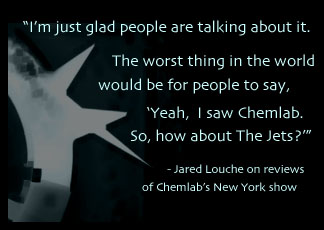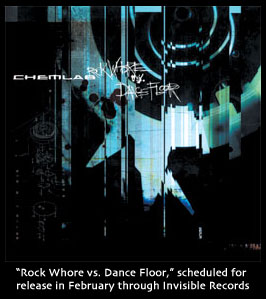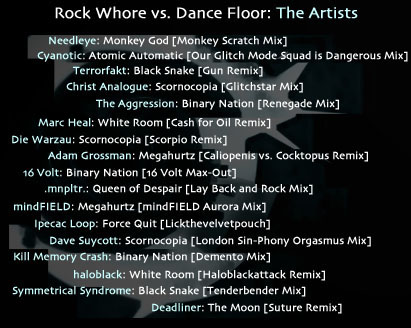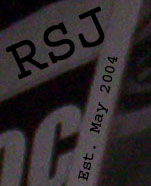|
Check back into 1997 for a moment and remember that there was once no reason to believe another Chemlab release would ever
see the light of day -- let alone another tour. However, after resurrecting the band's charred remains with 2004's "Oxidizer,"
Jared Louche has taken it a step further, bringing Chemlab to the stage for shows in Boston and New York. With another show
ahead in San Francisco, a possible tour to follow, as well as a remix accompaniment to "Oxidizer" on the way, Jared
talks about the future of a band that, just a few short years ago, most believed had no future at all.
Rock Star Journalism: Now that the dust has settled, how do you feel about the New York show?
Jared Louche: I had a great time, but there were certain mitigating circumstances. The sound on stage was not great.
There weren't enough monitors. For a straight rock band without any robot age accoutrements, that's fine -- two monitors,
no problem. But we're a machine rock band, the key word in that phrase being "machine." And you have to be able
to hear the machine part of it. Not being able to hear the backing tracks means that it's hard for me to sing in key, and
it's hard for everyone else to hear the breaks and changes.
Then, out in the house, it was not a great mix either. So, there's all this talk about "Oh, everything's on tape
and everyone was up there miming." There are bands who are woefully guilty of not actually playing any instruments.
This band was playing. And they rehearsed their asses off, but I think the sound system let them down to a certain extent.
And, yes, once again, because it is machine rock, part of its nature is to have either backing tapes or triggered sampled
loops. But it makes me laugh that people are saying, "Oh, it was Jared karaoke." I know that all the musicians
were actually playing and are good musicians.
At the end of the day, I'm just glad people are talking about it. The worst thing in the world would be for people to
say, "Yeah, I saw Chemlab. So, how about the Jets?" No matter what I do, it is completely impossible for me to
please everybody. Other people are either going to enjoy what I do, or they're not -- no matter what I do, that's the case.
So, I've got to do things that make me happy, and let me tell you, putting Chemlab back on stage, what a kick in the head.
Fuck off -- it was great.
RSJ: Originally, you said that Boston was going to be a one-off show; why did you decide to add New York and San Francisco?
JL: It's sort of like the head of Warner Brothers once said, in relation to a record, "This will be a limited edition
release -- limited to the amount of people that want to buy it." Yes, I said it would be a one-off, and it was. I don't
think there will ever be another Chemlab show in Boston like that one. But what I didn't say is that I'm really testing the
terrain to see a couple different things. One, I wanted to see whether or not it makes me feel good to do this again live.
Two, I wanted to see whether or not people would come. And three, I wanted to see whether or not it would make the people
who come feel good about what I was doing on stage. And the answers to all three were yes. All of that feeds into my desire
to put the band together. I can't say "back together" because that would mean roping in Dylan and Servo, and I
can't do that.
 RSJ: I did hear that Servo was around at that show.
JL: Yeah, he was, but I don't think he sees Chemlab as a viable option right now. I'd like to work with him, but he's
wrestling with his own stuff at the moment. The other thing is, he's busily touring around as drum tech for Bauhaus, and
I think they're gonna keep him roped in for awhile.
So, I can't say "back together," but I can say putting Chemlab together. Chemlab is not going to become the
touring machine that it was. We laid down a lot of rubber with that band and toured our asses off, and it was grand, but
the current construct of my life doesn't allow for that. I'm not ready to step into the back of a van yet. I want to get
a really good sense from around the country of if this makes sense. It makes sense in Boston, and now it turns out it makes
sense in New York. That gives me a reasonably good sense that the east coast would be viable. I'm debating a show in Chicago,
which would give me a sense of what the Midwest is like. Going out to San Francisco will let me know what's going on with
the west coast.
RSJ: How did you get involved with mindFIELD as your backing band?
JL: It's really Gabriel [Shaw] that I became involved with. I did a Christmas show in Boston about two years ago, just
one of my broken word shows. I talked to the promoter before the show and said that I really wanted to incorporate some noise
into this, besides just the backing tracks that I had. And the promoter said he knew just the person -- Gabriel from mindFIELD.
We met the evening of the show, and I told the stories and he unspooled a stream of disturbingly scraping, jagged, low rumbling
things that were loaded with incredible gravitas. So, he and I stayed in touch, and the first idea we had was to do a mindFIELD/Chemlab
show, just meld the two bands. And it went from there. We had a very immediate ease and the kind of secondhand language
that is required to be able to move through a project quickly, to get onto the same page without having to explain certain
reference points.
It became clear very quickly that this is someone I could work with on a long-term basis. He's a hard worker; he's got
the sort of work ethic that makes me happy. One of the most frustrating things about Chemlab in its original iteration was
that we were not prolific by any reckoning whatsoever. Seven years, two records? Fuck off. I mean, yes, we drank a lot,
we partied a lot, we did a lot of drugs, we did a lot of fighting -- but we did not do a lot of songwriting.
RSJ: So, you think Gabriel could be another partner for you in Chemlab?
JL: Oh, I do. There's all sorts of attendant issues tied up with writing another Chemlab record, and I think there will
be a couple musicians involved in that process, but I've gotta say, he's it. As long as he's willing to put up with me, we're
going to work together.
RSJ: With the San Francisco show coming up, you've got Babyland on the bill. How did that come together?
JL: I would love to take credit for that, but I can't. That was the promoter, Vera Blue, who dug them up. It's a fantastic
idea, and I'm so pleased about it. They've been one of the bands I always wanted to play with. I hope they don't burn the
club down before we play. But if they do, that just means we'll set up all the gear out in the parking lot and we'll play
out there as the building burns. Then we're really gonna have a party. And a marshmallow roast.
 RSJ: The release you have scheduled next is the "Oxidizer" remix disc, "Rock Whore vs. Dance Floor."
This was originally supposed to be a double disc, correct?
JL: Yes.
RSJ: Why did you decide to go with a single disc?
JL: My desire was to have it be a double record. My decision was for it to be a double record. My drive and solicitations
were toward putting out a double record. And I delivered a fantastically perverted and utterly upside down, face first in
the river its feet on fire, go-round of a double record. For me, it is a double album. I delivered it to the label, and
you will be receiving a single album. Work it out.
The remaining tracks are going to appear one way or another. The Chemlab website will host some of them. There are a
couple of different options; I know that there are some record labels that would like to put it out. But again we come back
to the politics of doing that. It could be more problematic than positive to release it on an actual label as opposed to
selling it on a website.
RSJ: Looking at the disc that will be released, what do you think sets this apart from countless other remix albums out
there?
JL: The tracks don't all sound the same. It's all over the place. Sadly, not as all over the place as the double disc
was, but it goes from stuff like Needleye and Cyanotic -- which are both aggressively over the top and much more Ministry-style
machine rock -- to Terrorfakt's remix, which is really mean aggro-dark dance floor. And then after that, you have Adam Grossman
from Skrew, who does this drone version of "Megahurtz" with Dwayne from Mentallo and the Fixer. Dave Suycott's
version of "Scornocopia" includes the London Symphony Orchestra. It's sort of Led Zeppelin in a way. It's not
a disc of remixes where you can dance to every single one or you can rock out to every single one. It's all over the place,
and I really like that.
RSJ: Do you have a particular favorite of the remixes?
JL: It's really hard for me to pick one out. They each have their own strengths and their own set of little metal teeth.
Kill Memory Crash is right up there. It's battling for the top seat. Although, as soon as I say that, Adam Grossman's remix
battles to gain ascendancy. Those two I think are easily two of the most interesting.
 RSJ: Speaking of people you've been working with -- I heard that Mark Spybey has his studio up again after the flood. Are
you going to resume the project you were working on with him?
JL: Yes. We've been talking about it already, and we're just trying to work out a mutually convenient time for it.
There isn't that much that needs to be done to it, so I think we'll be able to pull it together in a couple of sessions.
It's the kind of record that I really enjoy; it's very similar to a lot of stuff I did in the mid-80s. Not to say that it's
retro in any way, merely reminiscent of some of the experimental stuff I was doing.
RSJ: When I last talked to you about this project, you mentioned wanting to put videos of what you were doing on the Hydrogen
Bar site. Are you still planning to do that?
JL: I am. And we're going to put up a song or two. I use the word "song" very loosely and with all the poetic
license I am endowed with. We are going to put up some of the little clips I took, but it'll be film clips of a speaker cone
shot all too close as it vibrates with this bizarre loop running through it. It's that sort of thing.
RSJ: So, it's less documentary footage, and more art films?
JL: Yes. It will be annoying Jared-vision. I make a lot of what I call "flickers." They're not films. I
may be a pretentious self-centered egomaniac, but I'm not so stupid as to actually call myself a filmmaker. But with the
advent of the technology of the digital camera, I am allowed the ability to record things. It's not documentary footage;
it's just sound and vision, bent and mutated in my own way.
RSJ: You've talked about having a few projects in the works -- this project with Mark, a new solo album, a new Chemlab.
Which of these do you consider your priority?
JL: There are five possible records either in the works or that will start quite soon. I don't really know what's going
to come out next because I don't know which one is going to get finished off next, and I don't know who is going to release
whatever it is next. Part of what has slowed down some of that process is that the studio that I had access to previously,
I did not have access to all last year, and is now basically shot. But I think there is another studio that has opened its
doors to me. Which is great because I don't have a home studio, so I need to be able to insinuate myself into somebody else's
world. But, if this actually comes together that means I'll be able to bang out a couple of these things really quickly.
I'd really like it to be a year where I have three records that come out, none of them Chemlab. This is really going to
be a year for releasing other records and doing Chemlab live.
Got something to say about this feature? E-mail us.
|

